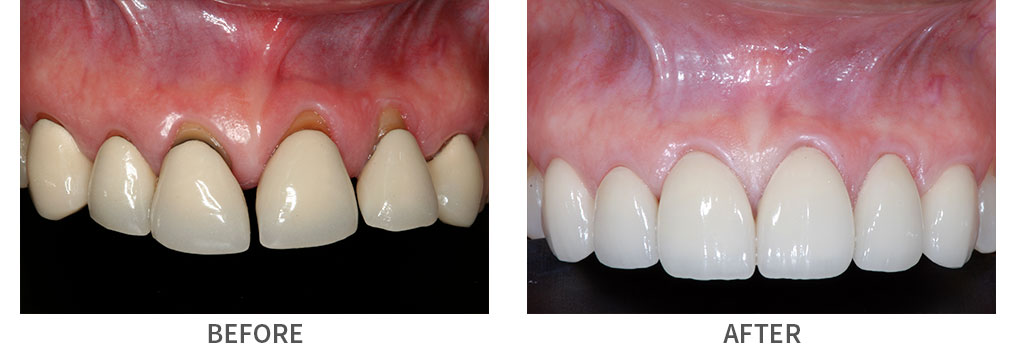Porcelain Crowns – Colleyville, TX
Strong, Beautiful, & Made Just For You.
Porcelain Crowns, also known as caps, are restorations that cover the external portion of a tooth down to the gum level. They can be used to simply restore a damaged tooth or can be designed to create an even better esthetic appearance. Porcelain crowns are the treatment of choice in situations where tooth decay has destroyed most of the original tooth or a large part of the tooth has fractured due to trauma. They are also indicated for teeth with severe tooth wear from acid erosion or from grinding or clenching one’s teeth. Unlike traditional porcelain-fused-to-metal (PFM) crowns or gold crowns that are cemented to the tooth, porcelain crowns are bonded directly to the tooth. This allows a tooth with minimal remaining tooth structure to be saved by simply bonding the final crown to the tooth.
Why Choose DFW Dental Implant Center for Porcelain Crowns?
- Custom-made for every patient
- Milled by our own in-house lab technician
- Able to repair damaged teeth & enhance aesthetics at the same time
What Are the Benefits of Porcelain Crowns?

- Improves chewing efficiency
- Resists staining from coffee, tea, cigarette smoke, red wine, and more
- Straightens crooked teeth
- Closes minor gaps between teeth
What Can You Expect During Cosmetic Dental Treatment?

Step 1: Perform Esthetic Evaluation of Your Smile
After evaluating the size, shape, color, and position of your teeth, as well as your smile, speech and lip position, a diagnostic model will be created. This diagnostic model will allow you to see a mock-up of your new teeth before any treatment is started.
Step 2: Evaluate Your Temporary Restorations
Using the approved diagnostic model, the teeth will be prepared and temporary crowns will be placed. These temporary crowns will allow you to visualize what the outcome will look like before the final restorations are made by the lab technician. At this point, any modifications to the diagnostic model can be noted so the lab technician knows exactly how to make your new teeth.
Step 3: Deliver Your New Porcelain Restorations
After 2 to 3 weeks, the Porcelain Onlays or Crowns will be tried in to evaluate your smile, speech and bite. After any necessary adjustments, the porcelain restorations will be permanently bonded and will blend seamlessly with your other natural teeth.
Patient Example
The upper front teeth had flared forward and had shifted apart because of excessive biting force being applied to these teeth after several back teeth had been removed. He wanted to have the spaces closed and the old porcelain-metal crowns replaced with something that would look more natural. After wearing braces for 9 months to position the teeth correctly, porcelain crowns were made for the upper front six teeth.

Dental Crown FAQs
How Long Do Dental Crowns Last?
While the exact lifespan of your dental crown can vary a bit, you can usually expect your porcelain restorations to last anywhere from five to fifteen years. This partially has to do with where the dental crown is located in the mouth—molars are under greater pressure than the front teeth, which means that crowns on them don’t last for quite as long.
More important than that, however, is who well you take care of your restoration. Keeping up with oral hygiene, avoiding foods that could damage porcelain, and quitting smoking can all make a positive impact on your dental crown’s lifespan.
Do Dental Crowns Get Cavities?
Your actual dental crown will be made out of porcelain, which is resistant to the erosion that causes cavities. For this reason, you don’t necessarily need to worry about your dental crown itself developing any kind of decay.
However, the seal on a dental crown isn’t completely air-tight, which means that it’s still possible for bacteria to sneak under your restoration. For this reason, it’s still possible for crowned teeth to develop cavities—in fact, it’s just as likely as in the case of an uncrowned tooth. It’s therefore still critically important that you maintain good oral hygiene.
Does It Hurt to Get a Dental Crown?
As with fillings, we will numb your mouth completely before treating your tooth for a dental crown. This is obviously important when your enamel is removed for your restoration—we will use a strong topical anesthetic to ensure that you are completely comfortable for the duration of this process. We don’t necessarily have to numb your tooth when we place your dental crown, but we would be happy to do so if you’d like.
After the preparation and placement of your crown, it’s common for you to feel a little sore for a few days. This should be fairly mild and you should be able to get through this period by taking OTC pain relievers as directed.
What Happens If You Wait Too Long to Get a Dental Crown?
If we’ve told you that you need a dental crown, it’s usually to deal with decay that could get substantially worse if left untreated. When patients put off a necessary dental crown, they could very easily start to see cavities expand and deepen. Relatively mild areas of decay could become severe, requiring a root canal or even a tooth extraction to deal with.
If you want to save time, money, and your tooth, it’s best to act quickly when we recommend that you get a dental crown.
